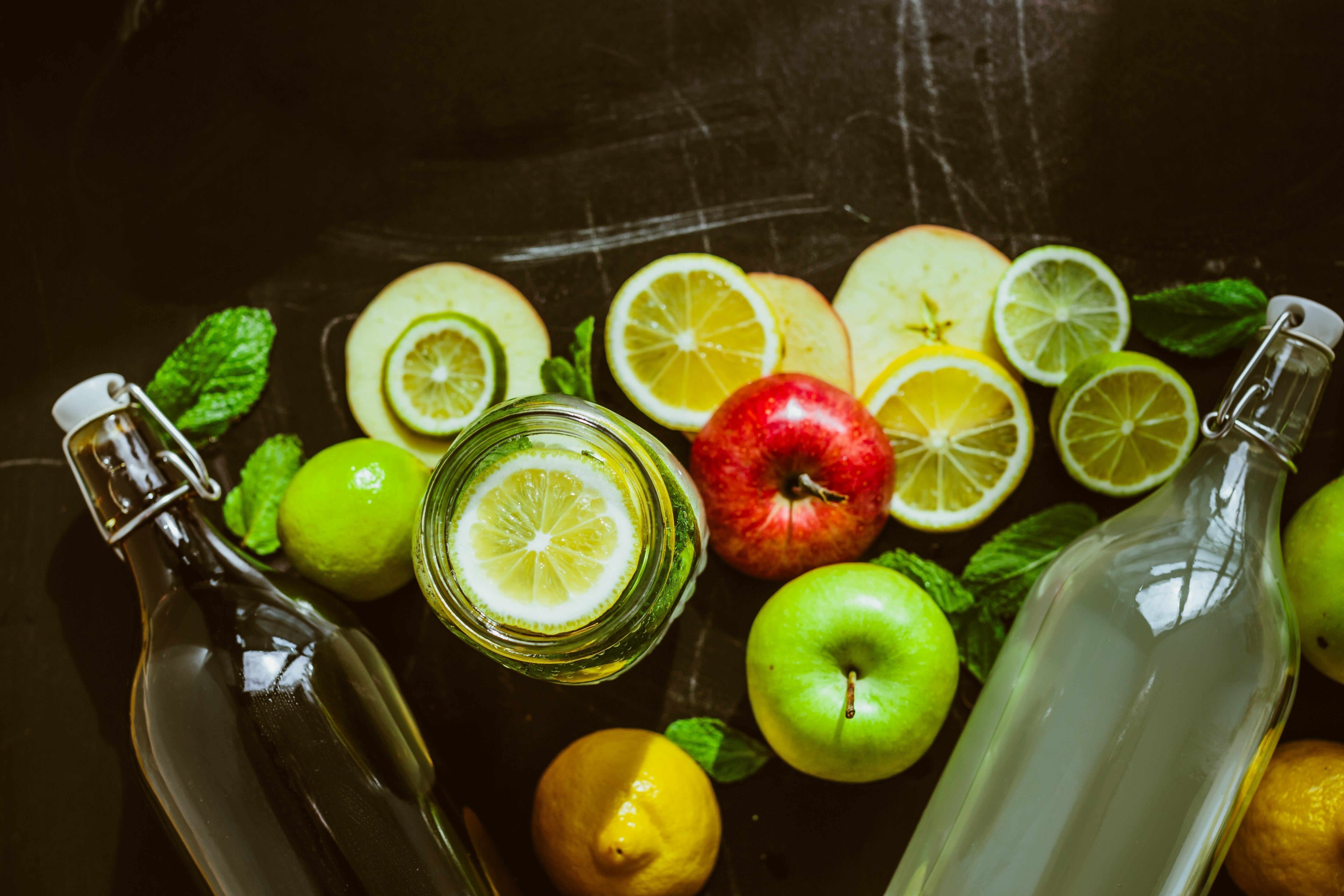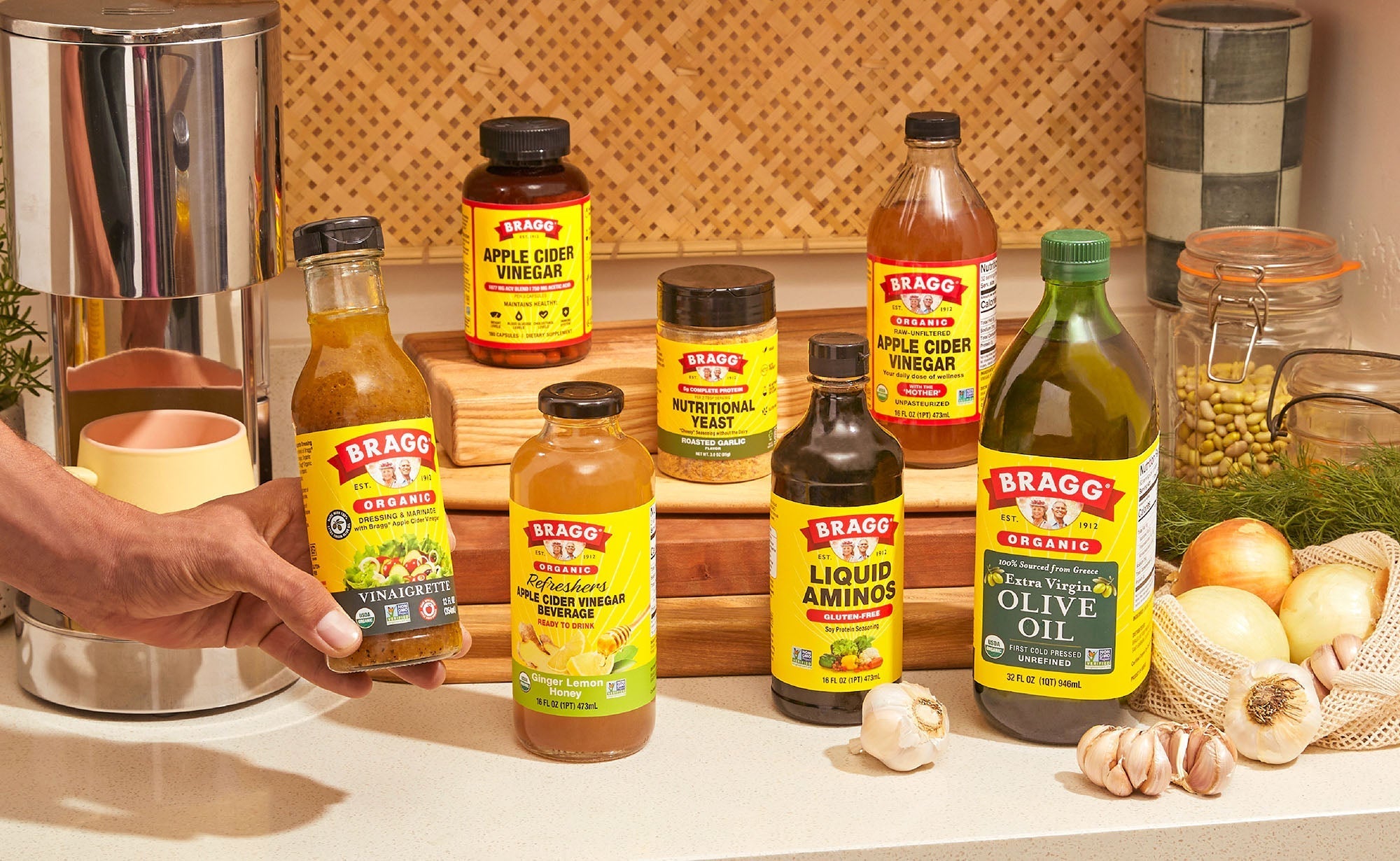Lemon Water vs. Apple Cider Vinegar: Which One Is Better for Your Health?
Reviewed By
Emilio Villarreal, Director of Technical Services
If you’ve ever scrolled through wellness blogs or wandered the aisles of your local health food store, you’ve probably come across these two popular staples in the wellness space: lemon water and apple cider vinegar (ACV). These two simple drinks have built reputations in the wellness world, often linked to benefits like hydration, and more.
But with so much hype surrounding both, it’s easy to get caught in the crossfire and wonder: which one is actually better for you? Should you start your day with a tangy splash of lemon or go for that vinegar bite?
Both have their loyal fans, but deciding which one should become your go-to morning ritual can feel like a bit of a head-scratcher.
If you’re someone who seeks clear, straightforward answers without the fluff, you’re in the right place. This article will compare lemon water and Bragg Apple Cider Vinegar across their wellness claims, nutritional support, and how they fit into your self-care routine.
By the end, you’ll have the knowledge to make an informed choice that’s right for you.
What’s All the Buzz About?
Both lemon water and apple cider vinegar have built their own followings, with fans swearing by their potential wellness benefits.
But what’s with all the hype? Here’s a quick rundown:

Lemon Water: Fresh, Simple, and Oh-So-Tangy
Lemon water is as easy as it sounds—just water with a splash of fresh lemon juice. Warm it up, sip it cold, make it however you like! It’s loved for being super simple, refreshing, and packed with hydration power.
Fans say it supports hydration and provides Vitamin C, which plays a role in normal immune function and skin wellness. Bonus points if you keep the pulp in since it’s loaded with pectin, a special fiber that’s a BFF to your gut bacteria.
Apple Cider Vinegar: The Bold, Funky Elixir
Apple cider vinegar (especially the raw, unfiltered kind like Bragg’s) is the wellness multitasker. Made from double-fermented organic apples, it’s been a wellness staple for decades…and honestly, it's still going strong for a reason.
Many people use ACV as part of their wellness routine and to add variety to their diet, and Bragg ticks many of those boxes because it's raw, organic, and always has "the Mother" (the good gut-loving bacteria) in every bottle.
While both have their strengths, the question remains: which one is better for you?
Wellness Benefits Compared
Nutritional Value
Lemon water provides Vitamin C, an antioxidant that contributes to normal immune function and supports skin wellness. Additionally, lemon water contains citric acid, which contributes to its cleansing and antimicrobial properties [¹]. On the other hand, Bragg ACV contains 750mg of acetic acid and "gut-loving bacteria” [²].
Winner: Both have unique nutrients, but if you’re looking for Vitamin C, lemon water is your go-to. For a happier gut and overall wellness, ACV takes the lead with acetic acid and friendly bacteria.
This content is intended for general informational purposes only and should not be interpreted as nutritional or medical advice. Individual nutrient needs vary, and it's best to consult a healthcare professional to determine what’s right for you.
Digestion
Some people drink lemon water before meals as a refreshing way to hydrate and prepare for eating. Lemon water can help support digestion by stimulating stomach acid production.
However, ACV’s acetic acid and naturally occurring good bacteria—found in “The Mother”—make it a popular choice for those looking to support their overall digestion as part of a balanced lifestyle.

Winner: ACV! ACV is often included in digestive wellness routines due to its acetic acid content and the naturally occurring bacteria in “The Mother”.
While many people include lemon water or ACV in their wellness routines to support digestion, these ingredients are not intended to diagnose, treat, or cure any digestive condition. Speak with your healthcare provider before making changes to your digestive health regimen.
Acid-Base Balance
While both lemon water and ACV are acidic before digestion, some wellness enthusiasts describe lemon water as “alkaline-forming” once metabolized. This idea comes from the popular alkaline diet theory, which suggests that certain foods may influence the body's pH balance, particularly urine pH.
However, it’s important to note that the body naturally maintains a tightly regulated pH range, and the effect of individual foods on systemic pH or inflammation is still debated.
Winner: If you're exploring the alkaline diet, lemon water tends to be more commonly associated with that approach.
The concept of food influencing systemic pH is debated and not fully supported by science. The body regulates pH tightly, regardless of diet. Any dietary changes should be discussed with a qualified medical professional.
Skin Wellness
Vitamin C in lemons plays a role in collagen synthesis and supports normal skin function; however, its direct application to the skin doesn’t yield conclusive results. On the other hand, there also are not enough studies to demonstrate that topical ACV alone has a direct beneficial effect on the skin.
Winner: Plot twist- neither! Our Bragg Renew Supplement actually takes the cake here.
While ACV may offer potential topical skin benefits, our Renew formula is specially designed to support skin hydration and renewal from the inside out—thanks to its phytoceramide complex and powerful ACV foundation.
Skin responses vary widely. Always patch test before applying diluted ACV or lemon to your skin. These natural ingredients are not intended to replace skincare treatments or address underlying skin conditions. Consult a dermatologist before incorporating new elements into your skincare routine.
Potential Blood Sugar Support
Some studies have explored how acetic acid in vinegar may influence post-meal blood sugar levels, though more research is needed.
One study published in 2013 in the Journal of Functional Foods suggests that drinking apple cider vinegar before eating reduces blood sugar spikes [³]. Other research has looked at how small amounts of ACV taken with meals may impact how the body processes starches and sugars [⁴]. It's not completely understood why this happens… believe that compounds in the vinegar interfere with starch absorption.
Lemon water, while hydrating and refreshing, doesn’t boast these potential benefits.
Winner: ACV is a popular addition to wellness routines and may be included as part of a balanced lifestyle. If you're looking to support healthy blood sugar. levels, be sure to consult your healthcare provider for personalized guidance.
Research on ACV and blood sugar is ongoing and not conclusive. ACV is not a replacement for medical treatment or blood sugar management plans. Always consult with a healthcare professional if you have concerns about blood sugar levels or are managing a condition such as diabetes.
Ease of Incorporation into Your Routine
Lemon Water:
- Easy to prepare with one fresh lemon and a glass of water. Lemon water can be made with either warm or cold water, depending on personal preference.
- Enjoyable for most people, thanks to its light and refreshing taste.
- Can be sipped throughout the day.
Apple Cider Vinegar:
- Apple cider vinegar has endless possibilities… just see our recipes over here on our community cookbook.
- The strong, tangy taste can be polarizing for some people. Adding honey can improve the taste of apple cider vinegar…or you can make it easy for yourself and just try the Bragg lineup of ACV Blends.
- Works best as a morning tonic, added to salad dressings and health tonics, as a cleaning agent, or as a hair care rinse (for you…and your dog). Just to mention a few.

How to Drink Apple Cider Vinegar
As mentioned above, apple cider vinegar's strong flavor can be polarizing and potent (hence why our ACV Blends collection is a thing). If the strong taste and smell make you hesitant, don’t worry, there’s an easy fix! Just mix 1-2 tablespoons with 8 ounces of water, juice, or even tea, and voilà! It’s way more enjoyable.
Pro tip: Just starting your ACV journey? Take it slow with small sips first, then work your way up. And don’t forget to rinse your mouth afterward to keep your teeth happy and safe from enamel erosion.
Are There Any Downsides?
Lemon Water: The natural acidity of lemons may contribute to enamel sensitivity over time, especially with frequent or prolonged exposure. Using a straw and rinsing your mouth with water afterward are common practices that may help reduce contact with your teeth.
Apple Cider Vinegar: Because of its high acidity, it's recommended to dilute ACV before drinking. Undiluted consumption may be tart for some individuals. Starting with small amounts and drinking it through a straw can be gentler on your system.
In short, like anything, both should be consumed mindfully.
Balanced Diet and Lifestyle
Apple cider vinegar and lemon water can be thoughtful additions to a well-rounded routine—but they’re not cure-alls. The real foundation of feeling your best still comes down to the basics: nourishing your body with a variety of fruits, vegetables, whole grains, and lean proteins; staying active; getting quality sleep; and managing stress in healthy ways.
Incorporating lemon water or diluted apple cider vinegar into your daily habits may complement this balanced lifestyle. Just remember—wellness is about consistency, not quick fixes. And before making any significant changes, it's always a good idea to talk with your healthcare provider.
Which One is Right for You?
Your decision really comes down to what you’re striving to achieve:
- Choose Lemon Water if… you want a refreshing hydration option that supports Vitamin C intake and helps with gentle detoxification.
- Choose Apple Cider Vinegar if… you enjoy the taste and want to include fermented ingredients in your wellness routine.
Personal preference plays a significant role in choosing between lemon water and apple cider vinegar, as individual taste and comfort are important factors to consider.
For the best of both worlds, you can incorporate both into your day (or even together). Start your morning with warm lemon water and take a diluted shot of ACV before lunch or dinner… or simply mix them!
This content is for informational purposes only and is not intended to provide medical advice or replace guidance from a healthcare professional. Individual wellness needs and tolerances vary, so it’s important to listen to your body and consult with a qualified provider before making changes to your daily routine or introducing new ingredients like lemon water or apple cider vinegar.
Why Bragg Apple Cider Vinegar Stands Out
When it comes to ACV, quality matters, and Bragg is the original Apple Cider Vinegar brand trusted by generations. With 5% acetic acid and “The Mother” (a blend of beneficial proteins, enzymes, and probiotics), Bragg’s Organic Apple Cider Vinegar is THE gold standard. Bragg’s dedication to providing real, raw, and effective solutions ensures every sip supports your wellness goals.
Explore the full range of our products and elevate your self-care game with products that have stood the test of time (seriously… we’ve been around since 1912).
One Final Squeeze
Both lemon water and apple cider vinegar have potential wellness benefits and can be valuable additions to your wellness routine. What matters most is understanding your specific needs and goals so you can choose the option that supports your path to optimal well-being.
Looking to incorporate ACV into your daily rituals?
Explore Bragg’s trusted Apple Cider Vinegar products—crafted to help support your wellness journey, one thoughtful step at a time. Shop now and find your perfect match.
Sources
- pmc.ncbi.nlm.nih.gov/articles/PMC11460347/
- https://www.bragg.com/blogs/science/apple-cider-vinegar-how-it-is-made-and-what-makes-it-so-good
- https://www.sciencedirect.com/science/article/abs/pii/S1756464613001874
- https://karger.com/anm/article-abstract/56/1/74/40516/Examination-of-the-Antiglycemic-Properties-of?redirectedFrom=fulltext


